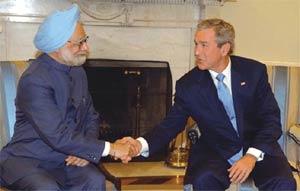|
Washington: It now appears that along with his travel clothes the Indian prime minister, Manmohan Singh, will also have to pack a few ''assurances'' on the Indo-US nuclear deal when he arrives in Washington on a state visit on 24 November. Should both sides fail to resolve a bureaucratic issue thrown up by the Obama administration, very intent on its NPT agenda, the 'signal honour' granted to Manmohan Singh - as the first foreign dignitary invited for a state visit to the United States - may shed some shine before the trip is over.  It now turns out the Obama administration, under the aegis of the US department of energy, has sought an "assurance" from India on nuclear non-proliferation under provisions of its Code of Federal Regulations Part 810 (pronounced Part Eight Ten) before it should be able to provide clearances to American companies for Indo-US civil nuclear trade. It now turns out the Obama administration, under the aegis of the US department of energy, has sought an "assurance" from India on nuclear non-proliferation under provisions of its Code of Federal Regulations Part 810 (pronounced Part Eight Ten) before it should be able to provide clearances to American companies for Indo-US civil nuclear trade.
In the absence of such an "assurance," India has been told, the US department of energy would not be able to issue the mandatory license permitting nuclear trade. Under the section 57.b of the US Atomic Energy Act of 1954, as amended, only the secretary of energy is authorised to give permission, directly or indirectly, to persons or companies in the production of special nuclear material outside the US. The provision applies to technology transfers and technical assistance to all activities of the nuclear fuel-cycle, including non-power reactors. Assurance is the word
It is now being given to understand that when the Indian side sought to activate the ''arrangements and procedures'' provisions of the 123 agreement in February, soon after the Obama administration was sworn in, it received a letter from Washington seeking 'assurances,' under which American spent fuel would be reprocessed in India. This matter has been carefully kept under wraps since February 2009 and may now have popped out in the open since no resolution appears to be in sight. The letter from the Obama administration asked India to furnish another document in which it would 'assure' the US that technology transfer and technical assistance to India by the US companies under the 123 agreement would meet its nuclear non-proliferation standards. Taken aback, the Indian side queried the need for such a letter when all non-proliferation concerns had already been addressed as part of the intense negotiations of which the Indo-US civil nuclear treaty itself was the result. The issue came up once again in the course of a July visit by secretary of state, Hillary Clinton, to India. As a result, teams involved in discussions on ''arrangements and procedures'' part of the 123 agreement, are now discussing the 'assurances' imbroglio as well. As part of its attempt to justify the need for 'assurances,' the US side has apparently furnished copies of similar assurances from other countries, including China and Germany, to India. The Indian side will obviously be treading warily on the matter as the Indo-US civil agreement is essentially the result of a delicately wrought understanding of mutual positions that compels both nations to jettison hardline positions and accept a compromise that results in a larger good. 'Assurances' under Part eight ten may impact some of these understandings - if not remove the ground from underneath the Indo-US civil nuclear agreement altogether. The main factors considered in Part 810 review are technical, political, economic, proliferation, and national security significance of proposed assistance; agreement for Nuclear Cooperation (123 Agreement); IAEA full scope safeguards/additional protocol (or equivalent) and other non-proliferation controls and conditions which includes government assurances and reporting requirements. A reading of the 57.b of the US Atomic Energy Act of 1954 may also be instructive in this regard. Section 57b of the Atomic Energy Act in pertinent part provides that: ''It shall be unlawful for any person to directly or indirectly engage in the production of any special nuclear material outside of the United States except (1) as specifically authorized under an agreement for cooperation made pursuant to section 123, including a specific authorization in a subsequent arrangement under section 131 of this Act, or (2) upon authorization by the Secretary of Energy after a determination that such activity will not be inimical to the interest of the United States: Provided, That any such determination by the Secretary of Energy shall be made only with the concurrence of the Department of State and after consultation with the Arms Control and Disarmament Agency, the Nuclear Regulatory Commission, the Department of Commerce, and the Department of Defense.'' Since the secretary of energy cannot provide ''authorisation'' unless he receives clearance from all the departments and agencies listed under section two of the above provision, it stands to reason that he is seeking an ''assurance'' from India on behalf of one or all these departments and agencies. Since all these are administrative departments of the Obama administration, surely the department heads can come together and sort out who requires an assurance and for what reason? Surely Barack Obama can sort out matters that seem to have hit some kind of a bureaucratic wall. Surely, the departments of state, defense, commerce and the NRC and the ACDA are working together to further the great ''strategic'' partnership the United States has promised to promote with India. Or is one, or all, of these departments more divine in its approach to non-proliferation issues than the others – for that matter, more divine in its approach than the Oval Office itself?
|